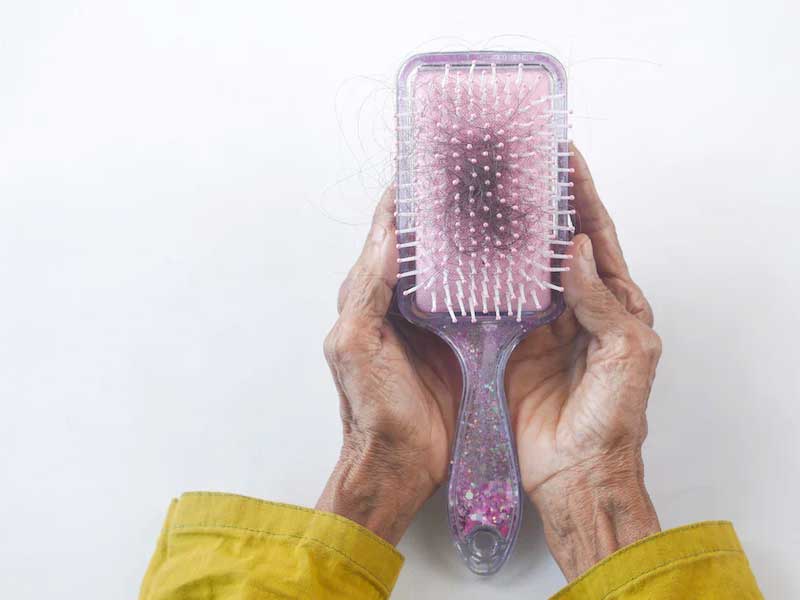Hair Loss Causes and Symptoms
Hair loss has a variety of causes, and there is no one cause that causes all cases. Genetic predisposition, repetitive trauma, immune system attack, and medicine and surgical procedures are just some of them. However, the information below offers some insight into the causes and symptoms of hair loss. Listed below are a few common causes of hair loss.
Stress
The body responds to long-term, chronic stress by altering hormone levels, which affect hair growth and loss. Studies have shown that chronic stress contributes to greater hair loss than age or genetics. One of the more acute forms of stress-induced hair loss is called telogen effluvium.
One of the best ways to prevent stress-induced hair loss is to avoid stressful situations. It is also important to take good care of your hair. You can try to eat a healthy diet or use a topical medication. Lastly, you must learn to manage your stress. You may need to visit a mental health counselor to learn more about the problem and develop a comprehensive treatment plan.
Stress causes hair loss by affecting the follicles that make hair. These follicles go through three phases: anagen, catagen, and telogen. In anagen, the hair pushes through the skin. In catagen, the follicle at the base shrinks. In telogen, the strand falls out. Throughout a person’s life, hair can regenerate. The stem cells in the hair follicle drive this cycle. During growth, these cells divide, while they are inactive during the resting phase. In times of chronic stress, these cells begin to shrink, causing hair loss.
There are many factors that can contribute to stress and hair loss. However, there is no one definitive cause for this condition. Stress affects hair in different ways, depending on the person’s age and the circumstances. Fortunately, hair follicles will typically regrow once the stress has passed. If you are experiencing significant amounts of stress, you should seek out medical advice.
In addition to seeking medical advice, you can practice self-care. Exercise can help you release endorphins and reduce stress. Also, you can try meditating. Meditation can help you banish anxiety and increase the amount of sleep you get.
Malnutrition
Hair loss is a common problem for both men and women and can have several causes. Some of these causes include malnutrition. This can result from a poor diet, eating disorders, too much or too little vitamin A, or certain illnesses such as thyroid disease, diabetes, lupus, or radiation therapy. Malnutrition also affects hormone levels and can disrupt the hair-growth cycle.
There are different forms of malnutrition, and if your symptoms are severe, you may need to visit a dermatologist. A doctor can prescribe you various treatments for hair loss. A vitamin supplement can help make hair follicles stronger. It can also be helpful to eat more food with high amounts of biotin.

Immune system attack
Alopecia areata is an autoimmune disease that is caused by the body’s immune system mistakenly attacking hair follicles. This inflammation leads to hair loss. Researchers don’t know exactly why this occurs, but they do know that genetics and environmental factors play a role. The disease can also affect the scalp and cause other symptoms. In these cases, it is important to see a dermatologist.
Generally, autoimmune diseases are a result of the immune system attacking healthy tissue. This means that your immune system mistakenly perceives healthy tissue as foreign, which causes it to send antibodies to attack those inflamed tissues. This can lead to chronic inflammation, resulting in numerous symptoms. Among them, hair loss is a common symptom. In addition, patients may also suffer from poor circulation in the scalp, increased free radicals, and hormonal imbalances.
Surgical procedure
Surgical procedures for hair loss involve inserting hair follicles into areas of the scalp that have thinning hair. After the procedure, the scalp will be bandaged and a bandage is removed a few days later. New hair will grow in this area within three to four months. The surgery may be performed on the same day or at a later date. Patients should avoid strenuous activities until at least 10 days following the procedure.
During the surgical procedure, a surgeon makes a Y-shaped incision at the top of the head toward the back. Then, he or she pulls hair-bearing tissue from the back and sides of the donor area. A needle is used to insert the hair-bearing tissue into the recipient site. The surgery takes anywhere from two to four hours under general anesthesia.
Another type of surgical procedure for hair loss is called a scalp reduction. While it can be successful in restoring the hairline, the procedure isn’t right for every patient. If you’re considering it, you should consult several surgeons. A specialist in hair loss will evaluate your scalp and recommend the best procedure for you.
Hair transplantation is the most common surgical procedure for hair loss. This procedure involves extracting quality hair follicles from the donor area and grafting them into the balding area. The procedure can also restore eyelashes, eyebrows, and other hair strands. Additionally, it can also help hide scars or other imperfections. If you are worried about the procedure, you should know that it can take a long time to recover.
A non-surgical procedure for hair loss is called PRP therapy. PRP therapy is a treatment that uses a patient’s own blood platelets to promote hair growth. Blood is made up of four components: red blood cells, white blood cells, plasma, and platelets. Then these four components are extracted and injected into the scalp. These platelets have beneficial properties that can restore hair. Another benefit of PRP therapy is that it carries zero risk of rejection.
Medical condition
Some medical conditions can cause hair loss, and the best way to find out if you have this condition is to consult your doctor. Some of the most common hair loss conditions are related to hormonal changes, nutritional deficiencies, and medications. In addition, medical conditions like COVID-19 can also cause hair loss. These symptoms are temporary and may go away within weeks or months. If you notice that your hair has been falling out, you should visit a MinuteClinic provider to get the right diagnosis and treatment.



